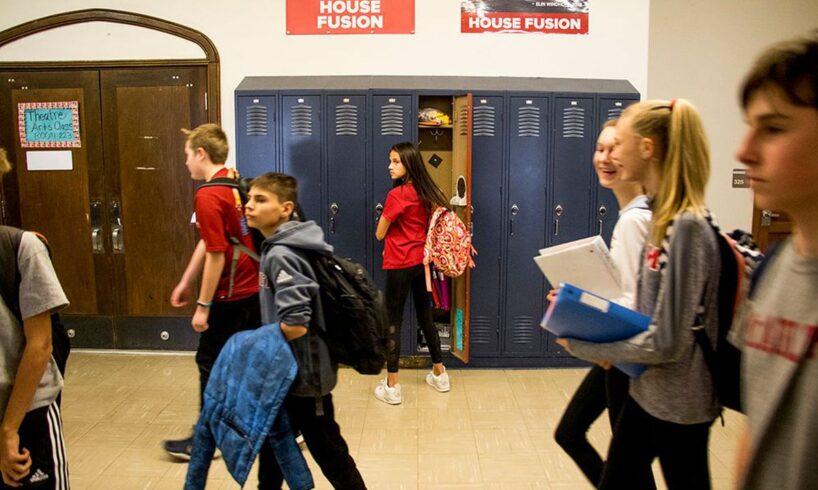
The fight over Denver’s semi-autonomous schools has made its way to the state Capitol, where two lawmakers introduced a bill supporters say is crucial to protecting the success of the city’s innovation zones but opponents say undermines the local school board.
An innovation zone is a group of semi-autonomous district schools managed by a nonprofit organization. School boards must approve the creation and expansion of innovation zones. If a zone disagrees with a board’s decision, Senate Bill 197 would allow a neutral third party to hear the dispute and issue a binding resolution, giving zones a recourse they don’t currently have.
“Without the updates proposed by 197, we are leaving the stability of some of Colorado’s most successful public schools at the mercy of local politicians,” Francine Mugge told the Colorado Senate Education Committee Thursday. Mugge is the mother of three children who attend Swigert International School, a Denver elementary school in an innovation zone.
But Denver Superintendent Alex Marrero called the bill a “violation of local control.” School board member Scott Baldermann said it “takes away the voice of the voters” by putting decisions in the hands of a third-party arbitrator rather than the elected school board.
“The voters of Colorado elect school boards to be the decision makers,” Baldermann said.
Senate Bill 197 passed the Senate Education Committee 6-1 Thursday. State Sen. Tammy Story, an Evergreen Democrat, was the sole no vote. The bill now moves to the full Senate.
Though Senate Bill 197 is a statewide bill, it would only affect Denver Public Schools, the birthplace of innovation schools and the district that has most heartily embraced them. Denver is also the only district in Colorado with innovation zones managed by nonprofits. The bill is sponsored by two Denver Democrats, state Sens. James Coleman and Chris Hansen.
The debate over innovation zones in Denver has been heating up for a few years. Denver has three zones that contain a total of 12 schools. In addition to having flexibility over their budget and curriculum, the principals in the zones are overseen by zone executive directors rather than district supervisors. The zone executive directors work for nonprofits overseen by their own boards of directors.
Educators say the zone structure allows them to tailor what they teach, and how they teach it, to the students they serve. It also allows them to opt out of less relevant district mandates.
While supporters see innovation zones as a mold-breaking third way to approach public education that exists between traditional district-run schools and independent charter schools, critics see zones’ autonomy as a dangerous step toward privatization.
Two years ago, a Denver school board member proposed changing the way teachers at a district-run school vote on whether to become a semi-autonomous innovation school. The proposal sparked such pushback that the board agreed on a compromise: an eight-month pause on any new innovation requests to consider “tension points” in the process.
When two Denver innovation schools applied to join the existing zones seven months later, the board denied their requests. Unlike charter schools that can appeal local board decisions to the State Board of Education, the innovation schools had no recourse.
The next month, Coleman, who has close ties to innovation leaders in Denver, added language to the Colorado School Finance Act effectively instituting a statewide pause on local boards making changes to innovation zones while the state did its own review.
Senate Bill 197 is the result of that review, Coleman said. It would do three things: institute the dispute resolution process, codify that innovation zones can be managed by nonprofit organizations, and ensure that local boards review the performance of an innovation zone and the schools within it at the same time instead of on separate schedules.
The bill was likely to be controversial anyway, but a recent move by the Denver school board made the issue hotter. Last month, the board approved a proposal that limits innovation school and zone autonomy in an effort to shore up teacher job protections.
Going forward, Denver innovation schools and zones will no longer be able to waive Colorado’s version of teacher tenure or certain provisions of the Denver teachers union contract that gave them autonomy over their school calendars, hiring timelines, and more.
The Denver board approved the proposal over the loud objection of many innovation leaders and parents, some of whom testified in favor of the bill at the Capitol. Nearly as many people testified against it, including Rob Gould, president of the Denver Classroom Teachers Association, and Kallie Leyba, executive director of the American Federation of Teachers Colorado.
But unlike the Denver board, the Senate Education Committee sided with the innovation leaders. Most committee members seemed convinced that innovation zones need additional recourse when they disagree with decisions made by local elected officials.
“Would you not think a neutral third party would be a benefit here?” said state Sen. Barbara Kirkmeyer, a Brighton Republican.
This article was originally posted on Colorado lawmakers step in to protect Denver innovation zones